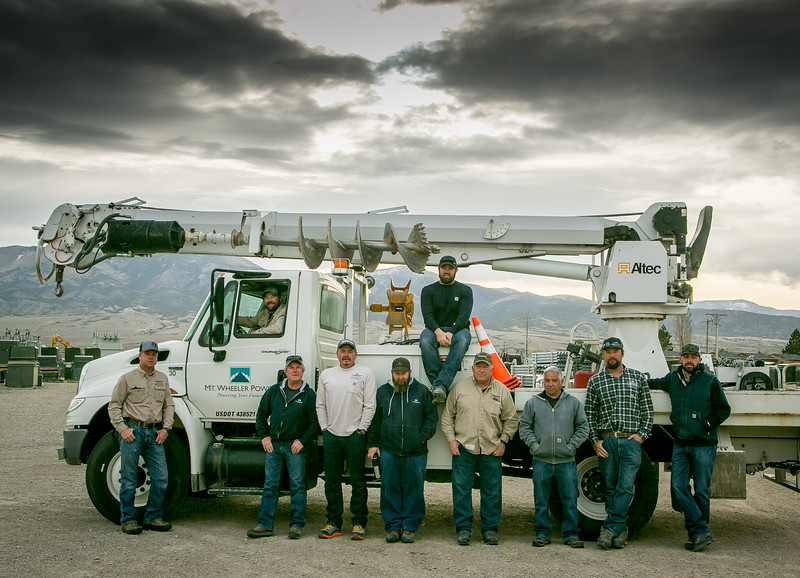
Left to right: Mitch McVicars, Jeramie Williams, Derek Williams, Michael Venturino, Brian Hicks, Jason McNutt, Joseph Pinta, Herm Romero, Niko Dobrescu, and Brett Hardy of Mt. Wheeler Power
The commercial distribution of electric power began in the late 1800s, and by the mid-20th century, most American homes and businesses had access to electricity. But a few rural “power deserts” still remained, including a large swath of land in central-eastern Nevada and parts of Utah, where there was little or no reliable electricity. Finally, in 1963, a new electric cooperative called Mt. Wheeler Power filled that void, and now the co-op provides electric and other services to 4,600 accounts spanning across seven counties in two states.
The IBEW 1245 members employed at Mt. Wheeler are tasked with keeping the system up and running, managing accounts, handling outages and troubleshooting issues — all without a SCADA system.
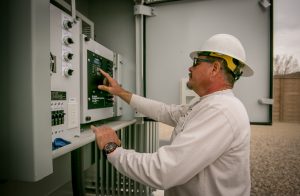
Michael Venturino checks on a substation
“We’ve got 12 substations in our system, we’ve got 16,000 square miles of service territory, and we’re in charge of all the substation transformers, all the breakers, the relays, regulators, control, repair, and maintenance,” said Substation Foreman Mike Venturino. “So on a daily basis, we do a lot of driving.”
Venturino works out of Mt. Wheeler’s main office in Ely, Nevada, but on any given day, his job could send him 140 miles or more in any direction. In addition to the work he does in his own region, he also will occasionally help out at Mt. Wheeler’s satellite offices in Eureka, NV and Baker, NV.
“We’ve got an outage scheduled with two mines over in our Eureka service territory, they want to isolate their 69kv feed,” said Venturino, who has been at Mt. Wheeler for 26 years. “So I’m working with them to work out a job description, job plan, safety analysis and switching orders.”
Those gold mines are among Mt. Wheeler’s biggest accounts, which comes as no surprise considering Nevada is one of the largest sources of gold in the entire world.

Tandy Haslem
Member Services Representative Tandy Haslem, who handles billing and other interactions with the co-op members, says the mines are generally easy to work with.
“Every representative I’ve ever spoken with at the mines has been nice,” she said.
Haslem is relatively new to Mt. Wheeler, and her last job was in the medical field, so she’s still managing the learning curve that all utility industry newcomers face.
“One of the hardest things I’ve had to learn here is the power lingo. Terms like ‘kilowatt,’ ‘kilowatt-hours,’ ‘voltage,’ ‘amperage,’ I didn’t know all of that,” she said. “I recently got nominated to be the safety meeting secretary, and I’m hoping to pick up a lot from that.”
Going underground
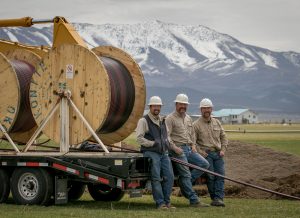
Left to right; Chad Bliss, Bill Baumann, and Jeremy Auch
In addition to the mines, the Local 1245 members at Mt. Wheeler also service a wide array of farms. The Utility Reporter caught up with Senior Line Foreman Chad Bliss as he and his crew performed some underground line work at a farm in Diamond Valley, near Eureka, NV.
This particular alfalfa farm wanted to install a sophisticated rotating irrigation device called a center-pivot. The device has seven large towers that are around 1,350 feet long, and each tower is equipped with a heavy duty motor which enables it to pump water from hundreds of feet underground.
But in order for the center-pivot to effectively water the crops, a substantial amount of underground utility work needed to be completed by Bliss and his crew.
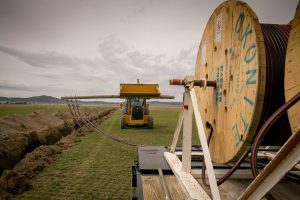
Chad Bliss of Mt. Wheeler Power lays power cables in a trench
“Right now, we’re digging in new underground 25kv three-phase line, putting underground transformers at each one of these wells, and then we’re going to remove the overhead power line that’s here, which will allow for the center pivot to be able to walk in a complete circle,” Bliss explained. “The challenge with this particular job is the ground is real gravelly and sandy, and it’s sloughing off. So we have to make sure that we get the underground cable in the ditch right behind the trackhoe, in case it sloughs off.”
The job, which took about a week to complete, entailed 3,000 feet of ditch, 9,000 feet of cable, and a lot of hard work on the part of the three-man crew.
“You have a say in what happens to you”
Mt. Wheeler’s sparsely-populated service territory isn’t exactly known as a hotbed of unionism, but the Local 1245 members at Mt. Wheeler are positively brimming with union pride.
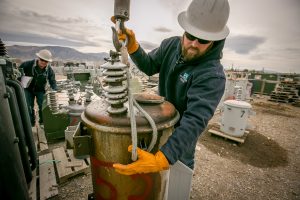
Jason McNutt, right, and Derek Williams of Mt. Wheeler Power load transformers on a truck for recycling
“The union does everything! It raises everybody up. It sets the price [of labor] across the industry, it brings wages up for both union and non-union,” said Venturino. “And it gives the workers a voice to sit down and bargain with the employer. You have a say in what happens to you.”
“I’m new to the whole union environment, and I really appreciate the comradery that comes with the union,” said Haslem. “They have my back, I have their back, it’s a whole brotherhood/sisterhood. It’s great!”
“I’ve been a member of the union since I started in the trade 25 years ago,” said Bliss. “I went through a union apprenticeship in Arizona out of Local 769, and I’ve had a great experience with the union ever since. Great people to work with, and I appreciate the attention to safety and always looking out for one another … and they’re always willing to help wherever needed.”
–Rebecca Band, IBEW 1245 Communications Director
Photos by John Storey
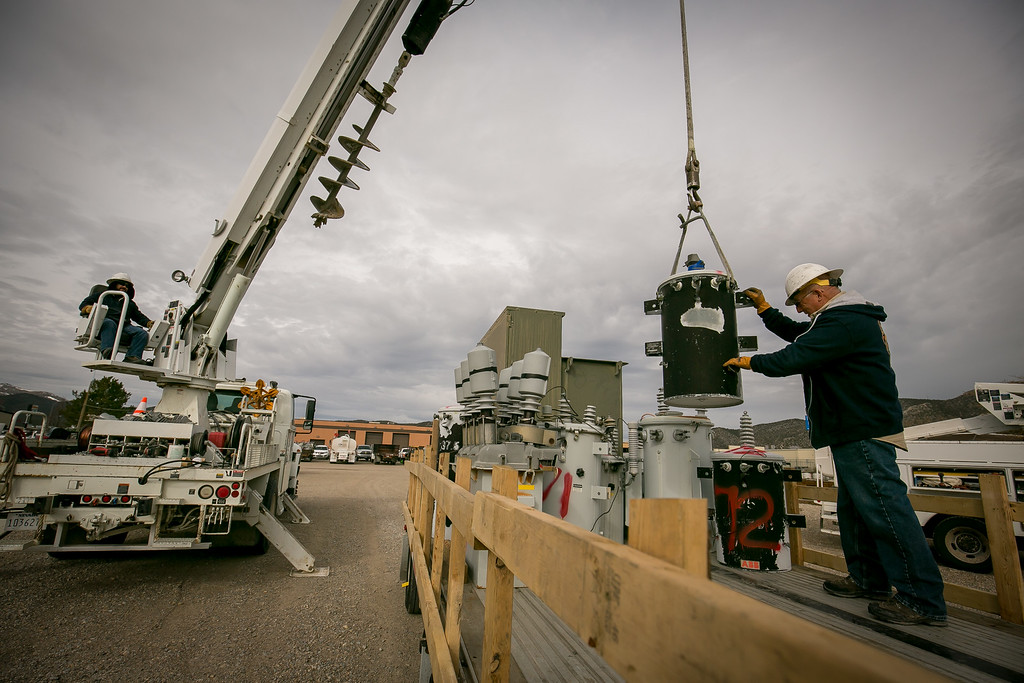
Joseph Pinta
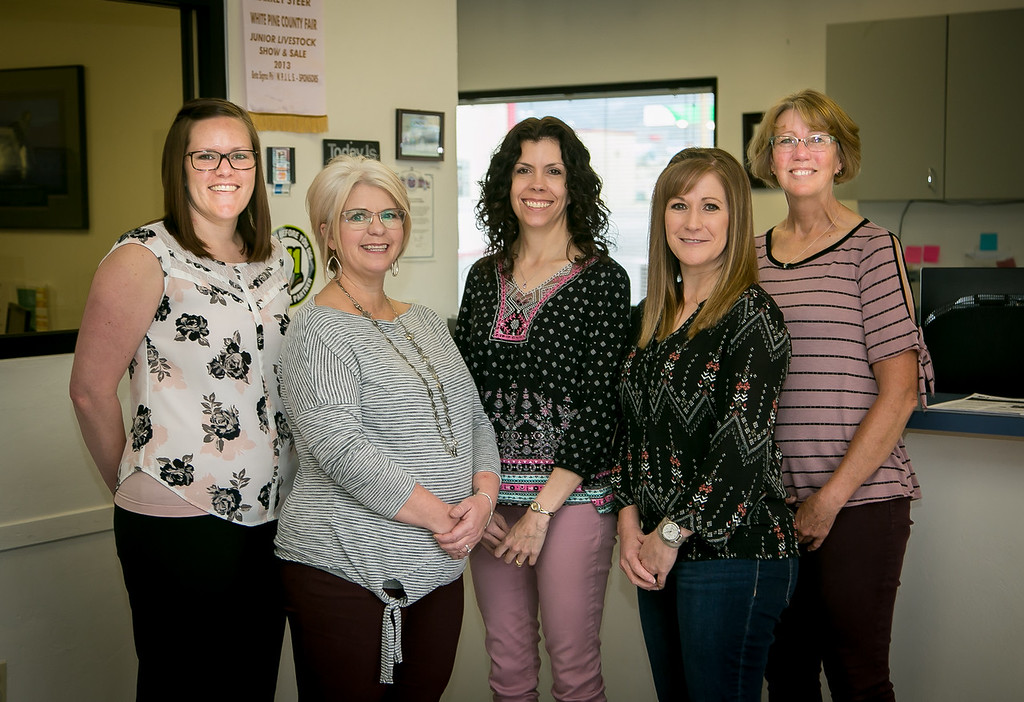
Mt. Wheeler's clerical team, from left: Tandy Haslem, Christina Sawyer, Lynn Sorenson, Lelly Jackson, and Sherrie Marquez

Bill Baumann

Mitch McVicars